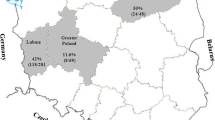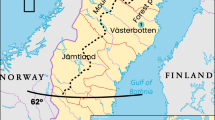Abstract
Toxoplasma gondii is a zoonotic protozoan of worldwide distribution. The present study provides information on risk factors affecting T. gondii infection in domestic and free-ranging wild ungulates sharing habitats in Mediterranean ecosystems in Spain. Serum samples from 482 extensively reared domestic ruminants and 2351 wild ungulates were tested for T. gondii antibodies using the modified agglutination test (MAT, cut-off 1:25). Toxoplasma gondii seroprevalence was 41.2% of 194 sheep, 18.6% of 199 cattle and 5.6% of 89 goats. The main risk factors associated with infection in livestock were the presence of cats, feeding on the ground and at stubble fields. In wild ungulates, T. gondii antibodies were detected in 10.5% of 1063 red deer, 15.6% of 294 fallow deer, 5.6% of 216 European mouflon, 5.6% of 90 Spanish ibex, 13.6% of 22 roe deer and 18.6% of 666 wild boars. The risk factors affecting T. gondii infection in wildlife were species, age and hunting season. Significantly higher seroprevalence was found in domestic ruminants, particularly in sheep, compared to the wild species tested. The present study indicates widespread exposure to T. gondii among domestic and wild ungulates in Southern Spain, with significant differences among species sharing the same ecosystem. The high seroprevalence observed in domestic ruminants, particularly in sheep, reinforces the need for farm management practices to control the risk factors associated with T. gondii infection in extensively reared livestock. Consumption of raw and undercooked food products from domestic and wildlife species may have important implications for public health.

Similar content being viewed by others
References
Apollonio M, Andersen R, Putman R (2010) European ungulates and their management in the 21st century. Cambridge University Press, Cambridge
Arenas-Montes A, García-Bocanegra I, Paniagua J, Franco JJ, Miró F, Fernández-Morente M, Carbonero A, Arenas A (2013) Blood sampling by puncture in the cavernous sinus from hunted wild boar. Eur J Wildl Res 59(2):299–303. https://doi.org/10.1007/s10344-013-0701-3
Calero-Bernal R, Pérez-Martín JE, Reina D, Serrano FJ, Frontera E, Fuentes I, Dubey JP (2016) Detection of zoonotic protozoa Toxoplasma gondii and Sarcocystis suihominis in wild boars from Spain. Zoonoses Public Health 63:346–350
Cook AJ, Gilbert RE, Buffolano W, Zufferey J, Petersen E, Jenum PA, Foulon W, Semprini AE, Dunn DT (2000) Sources of Toxoplasma infection in pregnant women: European multicentre case-control study. European Research Network on Congenital Toxoplasmosis. BMJ 321(7254):142–157. https://doi.org/10.1136/bmj.321.7254.142
Díaz P, Cabanelas E, Díaz-Cao JM, Viña M, Béjar JP, Pérez-Creo A, Prieto A, López CM, Panadero R, Fernández G, Díez-Baños P, Morrondo P (2016) Seroprevalence of Toxoplasma gondii and Neospora caninum in goats from north-western Spain. Ann Agric Environ Med 23(4):587–590. https://doi.org/10.5604/12321966.1226851
Dubey JP (2010) Toxoplasmosis of animals and humans. CRC Press, Boca Raton
Dubey JP, Desmonts G (1987) Serological responses of equids fed Toxoplasma gondii oocysts. Equine Vet J 19(4):337–339. https://doi.org/10.1111/j.2042-3306.1987.tb01426.x
EFSA (2007) Surveillance and monitoring of Toxoplasma in humans, food and animals. Scientific Opinion of the Panel on Biological Hazards. EFSA J 583:1–64
FAO/WHO [Food and Agriculture Organization of the United Nations/World Health Organization] (2014) Multicriteria-based ranking for risk management of food-borne parasites. Microbiological Risk Assessment Series 23:302
García G, Sotomaior C, do Nascimento AJ, Navarro IT, Soccol VT (2012) Toxoplasma gondii in goats from Curitiba, Paraná, Brazil: risks factors and epidemiology. Rev Bras Parasitol Vet 21(1):42–47. https://doi.org/10.1590/S1984-29612012000100009
García-Bocanegra I, Simon-Grifé M, Dubey JP, Casal J, Martín GE, Cabezón O, Perea A, Almería S (2010a) Seroprevalence and risk factors associated with Toxoplasma gondii in domestic pigs from Spain. Parasitol Int 59(3):421–426. https://doi.org/10.1016/j.parint.2010.06.001
García-Bocanegra I, Dubey JP, Martínez F, Vargas A, Cabezón O, Zorrilla I, Arenas A, Almería S (2010b) Factors affecting seroprevalence of Toxoplasma gondii in the endangered Iberian lynx (Lynx pardinus). Vet Parasitol 167(1):36–42. https://doi.org/10.1016/j.vetpar.2009.09.044
García-Bocanegra I, Cabezón O, Hernández E, Martínez-Cruz MS, Martínez-Moreno Á, Martínez-Moreno J (2013) Toxoplasma gondii in ruminant species (cattle, sheep, and goats) from Southern Spain. J Parasitol 99(3):438–440. https://doi.org/10.1645/12-27.1
Gauss CB, Dubey JP, Vidal D, Ruiz F, Vicente J, Marco I, Lavin S, Gortázar C, Almería S (2005) Seroprevalence of Toxoplasma gondii in wild pigs (Sus scrofa) from Spain. Vet Parasitol 131(1-2):151–156. https://doi.org/10.1016/j.vetpar.2005.04.023
Gauss CB, Dubey JP, Vidal D, Cabezón O, Ruiz-Fons F, Vicente J, Marco I, Lavín S, Gortázar C, Almería S (2006) Prevalence of Toxoplasma gondii antibodies in red deer (Cervus elaphus) and other wild ruminants from Spain. Vet Parasitol 136(3-4):193–200. https://doi.org/10.1016/j.vetpar.2005.11.013
Hosmer DW, Lemeshow S (2000) Applied logistic regression. Wiley Press, New York. https://doi.org/10.1002/0471722146
Jiménez-Ruiz S, Arenas-Montes A, Cano-Terriza D, Paniagua J, Pujols J, Miró F, Fernández-Aguilar X, González MA, Franco JJ, García-Bocanegra I (2016) Blood extraction method by endocranial venous sinuses puncture in hunted wild ruminants. Eur J Wildl Res 62(6):775–780. https://doi.org/10.1007/s10344-016-1056-3
Mainar RC, de la Cruz C, Asensio A, Domínguez L, Vázquez-Boland JA (1996) Prevalence of agglutinating antibodies to Toxoplasma gondii in small ruminants of the Madrid region, Spain, and identification of factors influencing seropositivity by multivariate analysis. Vet Res Commun 20(2):153–159. https://doi.org/10.1007/BF00385636
MAPAMA (2016) http://www.mapama.gob.es/es/biodiversidad/estadisticas/Est_Anual _Caza.aspx (accessed August 2017)
Millán J, Candela MG, Palomares F, Cubero MJ, Rodríguez A, Barral M, de la Fuente J, Almería S, León-Vizcaíno L (2009) Disease threats to the endangered Iberian lynx (Lynx pardinus). Vet J 182(1):114–124. https://doi.org/10.1016/j.tvjl.2008.04.005
Montoya JG, Liesenfeld O (2004) Toxoplasmosis. Lancet 363(9425):1965–1976. https://doi.org/10.1016/S0140-6736(04)16412-X
Panadero R, Painceira A, López C, Vázquez L, Paz A, Díaz P, Dacal V, Cienfuegos S, Fernández G, Lago N, Díez-Baños P, Morrondo P (2010) Seroprevalence of Toxoplasma gondii and Neospora caninum in wild and domestic ruminants sharing pastures in Galicia (Northwest Spain). Res Vet Sci 88(1):111–115. https://doi.org/10.1016/j.rvsc.2009.05.010
Richomme C, Aubert D, Gilot-Fromont E, Ajzenberg D, Mercier A, Ducrot C, Ferté H, Delorme D, Villena I (2009) Genetic characterization of Toxoplasma gondii from wild boar (Sus scrofa) in France. Vet Parasitol 164(2-4):296–300. https://doi.org/10.1016/j.vetpar.2009.06.014
Sáenz de Buruaga M, Lucio-Calero A, Purroy-Iraizoz FJ (2001) Reconocimiento de sexo y edad en especies cinegéticas. Edilesa, Leon
San Miguel JM, Gutiérrez-Expósito D, Aguado-Martínez A, González-Zotes E, Pereira-Bueno J, Gómez-Bautista M, Rubio P, Ortega-Mora LM, Collantes-Fernández E, Álvarez-García G (2016) Effect of different ecosystems and management practices on Toxoplasma gondii and Neospora caninum infections in wild ruminants in Spain. J Wildl Dis 52(2):293–300. https://doi.org/10.7589/2015-07-176
SSCCC - Spanish Superior Council of Chambers of Commerce (2009) Distribución comercial, estadísticas y estudios. Ministerio de Economía y Competitividad, Government of Spain. http:// www.comercio.gob.es (accessed August 2017)
Acknowledgements
The authors would like to give special thanks to the farmers and gamekeepers for their collaboration. This work was partially supported by projects AGL2013-49159-C2-2-R and INIA Grant FAU2008-00019-C03-01.
Author information
Authors and Affiliations
Corresponding author
Ethics declarations
Animals were sampled during the hunting season under Spanish and EU legislation. No animals were specifically hunted for this study and ethical approval by an Institutional Animal Care and Use Committee was not deemed necessary.
Conflict of interest
The authors declare that they have no conflict of interest.
Additional information
Section Editor: Larissa Howe
Rights and permissions
About this article
Cite this article
Almería, S., Cabezón, O., Paniagua, J. et al. Toxoplasma gondii in sympatric domestic and wild ungulates in the Mediterranean ecosystem. Parasitol Res 117, 665–671 (2018). https://doi.org/10.1007/s00436-017-5705-6
Received:
Accepted:
Published:
Issue Date:
DOI: https://doi.org/10.1007/s00436-017-5705-6




